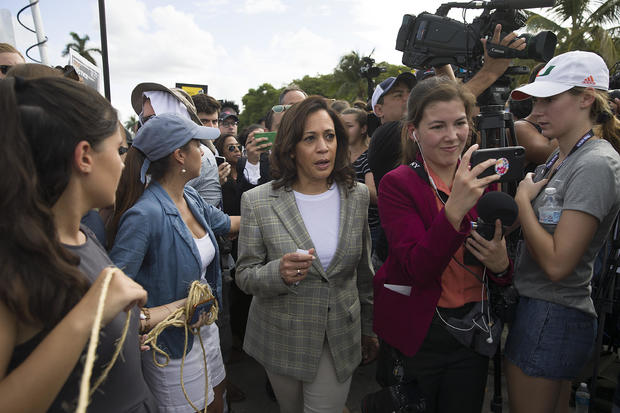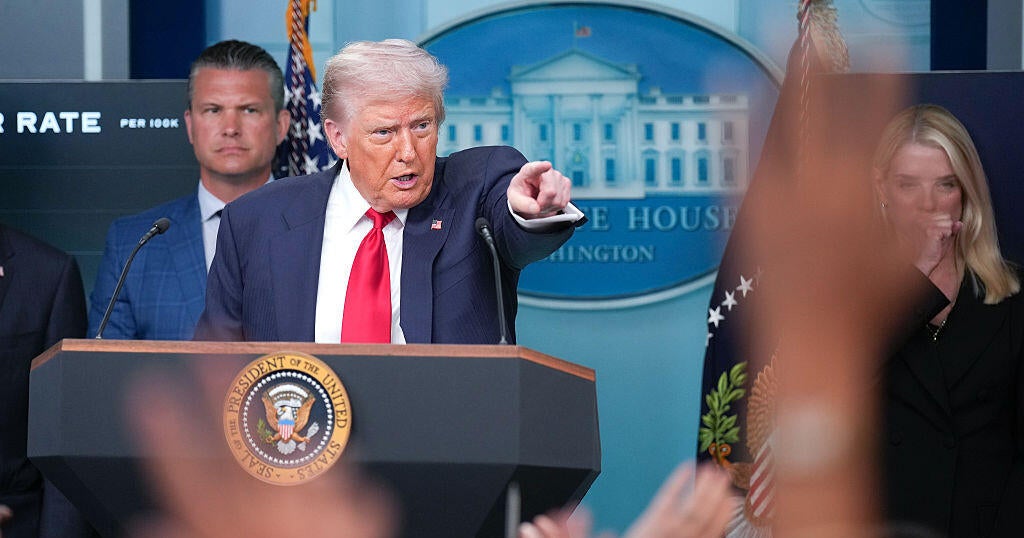"Birther" tweet targets Kamala Harris. 2020 Democrats rushed to her defense.
2020 Democratic hopeful Kamala Harris was the target of a birtherism-like attack — retweeted and then deleted by President Trump's son Donald Trump Jr. — targeting her identity as "not an American Black." Her rivals for the Democratic nomination jumped to her defense on Saturday, including former Vice President Joe Biden, who she confronted about race at Thursday's debate.
Harris was born in Oakland, California to parents who had emigrated to the U.S. from India and Jamaica. The viral tweet by right-wing personality Ali Alexander — whose Twitter bio claims that he "exposed" Harris and includes the hashtag #NeverKamala — mentioned her parents' background and said "I'm so sick of people robbing American Blacks (like myself) of our history. It's disgusting. Now using it for debate time at #DemDebate2? These are my people not her people."
The tweet appeared to get the attention of Donald Trump Jr., who has more than three million followers. Trump Jr. wrote "Is this true? Wow" on Thursday, but soon deleted it. A spokesman told The New York Times Trump Jr. was "asking if it was true that Kamala Harris was half-Indian because it's not something he had ever heard before."
Harris has often resisted sharing her personal background on the campaign trail. But during Thursday's debate, she confronted Biden about his history opposing busing and said she herself had been bused to a public school.
Harris' campaign manager, Lily Adams, said in a statement to CBS News "this is the same type of racist attacks used to attack Barack Obama. It didn't work then and it won't work now."
Harris' husband, Douglas Emhoff, expressed his gratitude on Twitter to those who came to his wife's defense. "...Thx to all the 2020 candidates and everyone else for calling out this crap for what it is"... Emhoff tweeted.
On Saturday, Sen. Elizabeth Warren of Massachusetts was the first 2020 candidate to tweet in support of Harris. "The attacks against @KamalaHarris are racist and ugly. We all have an obligation to speak out and say so. And it's within the power and obligation of tech companies to stop these vile lies dead in their tracks," Warren tweeted.
Sen. Cory Booker of New Jersey chimed in with a tweet saying "@kamalaharris doesn't have sh[**] to prove." Strong remarks also came from Washington Gov. Jay Inslee, former U.S. Rep. Beto O'Rourke and South Bend Mayor Pete Buttigieg. Biden, the current frontrunner, tweeted on Saturday "The same forces of hatred rooted in 'birtherism' that questioned @BarackObama's American citizenship, and even his racial identity, are now being used against Senator @KamalaHarris. It's disgusting and we have to call it out when we see it. Racism has no place in America."
President Trump was one of the leading voices, along with a group of conspiracy theorists, who questioned whether former President Obama was really born in the U.S. Earlier this month, Mr. Trump's son-in-law Jared Kushner, would not directly answer whether the president's birther conspiracy against Mr. Obama was racist.
Alexander fired back at the 2020 candidates who defended Harris on Twitter Saturday, claiming there is a "racist Democratic smear campaign against him." A Howard University Professor directly responded.
"Shut down the weaponized ignorance," said professor Greg Carr, Howard University's chair of Afro-American Studies. Carr pointed to the 2016 presidential primary campaign of Sen. Ted Cruz of Texas.
Cruz, who was born in Calgary, Canada, also faced criticism from the then-frontrunner, Mr. Trump, but Carr and other civil rights activists say Cruz did not face anywhere near the "crowd swell of birtherism" that former President Obama and now Harris have faced. Carr called birtherism race-based and absolutely racist.
There has been social media criticism of Harris and Booker — who is African American and from Newark, New Jersey — propelled by an online campaign that operates under #ADOS: American Descendants of Slavery. Online, the group says they "seeks to reclaim/restore the critical national character of the African American identity and experience."
Carr believes their social media discussion around reparations may be driving a conversation to separate those who are "black" and "African American" — or "American Black" as Alexander put it. Carr made sure to emphasize that ADOS has nothing to do with major national groups fighting for reparations, like the National Coalition of Blacks for Reparations in America. He connects ADOS to a group that attempts to create controversy or issues in black communities that might lead to nefarious goals, like suppressing the African American vote.
"What good does it do to any of us to assert pride of privilege in oppression," said Carr.
Carr said he would tell Ali "stop standing between attempts to solve our collective problems and people's attempts to understand how best to do it. This doesn't add anything positive to public discourse. And of course my next question would be if you are not in fact just acting out of ignorance, 'Who are you working for?' because we've seen this show before."







